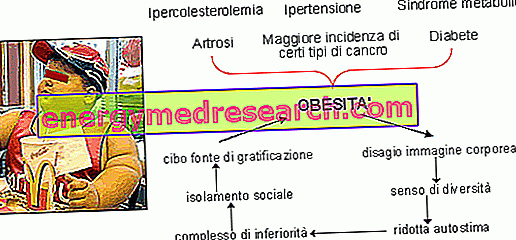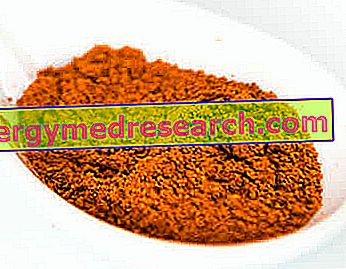Definition
Cystic fibrosis is a serious hereditary disease in which there is a malfunction of the exocrine glands, whose secretion is excessively rich in thick mucus; the abundance and density of mucus hinder the physiological flow of the secretion, thus creating serious glandular obstructions.
- the exocrine glands are appointed to transfer their secretions to the outside; these include: pancreas, sweat glands, salivary, intestinal and bronchial glands.
Causes
Cystic fibrosis is caused by a defect in the CFTCR gene, which is responsible for the alteration of a protein that regulates the transport of chlorine through the membranes of exocrine glands. Cystic fibrosis is a deadly disease with an autosomal recessive transmission, which occurs exclusively in homozygotes.
Symptoms
Cystic fibrosis is characterized by mostly intestinal and bronchial symptoms; in affected patients, moreover, there is a propensity to infections, in addition to the reduction in fertility caused by an increase in the viscosity of the cervical mucus. Other signs associated with the disease include: halitosis, catarrh, cirrhosis of the liver, abdominal cramps, digestive and respiratory difficulties, weight loss, muscle pain, fever, pharyngitis, loss of appetite, nausea, steatorrhea, cough, vomiting.
Information on Cystic Fibrosis - Cystic Fibrosis Treatment Drugs is not intended to replace the direct relationship between health professional and patient. Always consult your doctor and / or specialist before taking Cystic Fibrosis - Cystic Fibrosis Drugs.
drugs
A terrible and deadly disease, cystic fibrosis is by far the most common morbid condition genetically transmitted between the Caucasian race; being a hereditary condition, there is no cure capable of turning the disease upside down. Despite what has been said, cystic fibrosis patients are treated with drugs and other therapeutic aids aimed at reducing symptoms and preventing complications; targeted treatment may be needed to improve nutrient and vitamin absorption.
Cystic fibrosis patients tend to be malnourished; for this reason, it is advisable to follow a balanced diet (understood as a diet), with a right intake of calories.
As mentioned, cystic fibrosis patients have a greater propensity to infections and often complain of respiratory disorders; to cope with these problems, it is essential to take antibiotics, both to prevent and to cure the bacterial insult. Decongestant drugs are useful to help the patient breathe better; if this is not enough, cystic fibrosis patients may need oxygen supplementation, through a special mask placed above the nose and mouth.
In severe cases, cystic fibrosis can damage several organs; to treat the damage, it is possible to subject the patient to a surgical resection or organ transplant (lung / liver) operation.
Antibiotics : indicated to prevent or treat bacterial insults in the context of cystic fibrosis: in general, the indicative dosage for the administration of the antibiotic, in this case, is about double compared to the common bacterial infections, and the duration of the therapy must last for at least 2 weeks. However, the method of administration and timing must be established by the physician based on the damage reported and the pathogen involved.
- Amikacin (eg Chemacin, Mikan, Likacin): the drug belongs to the class of aminoglycosides. Indicated to treat Pseudomonas aeruginosa infections in patients with cystic fibrosis; the dosage must be customized based on the serum concentration; in general, take up to 35 mg / kg, once a day by intravenous infusion, in a single administration or in divided doses every 6-8 hours.
- Azithromycin: it is a macrolide antibiotic, used in therapy to treat Pseudomonas aeruginosa infections in children with cystic fibrosis: indicatively, take 250 mg of active every other day, for three days a week (Monday, Wednesday, Friday) for patients weighing 25-40 kg. If your child weighs more than 40 kg, take a double dose, as described above. If the dose is not tolerated by the patient, reduce the dose to twice a week. Consult your doctor.
- Aztreonam (eg. Cayston): therapy with this antibiotic involves taking a dose of 75 mg, through a 2-3 minute nebulization (with a special instrument); repeat the administration 3 times a day for 28 days. For the maintenance dose, repeat the treatment in cycles of 28 days, followed by another 28 days of stop. This antibiotic, indicated both in adults and children, is particularly effective against P. aeruginosa- supported infections in the context of cystic fibrosis.
- Tobramycin (Ex. Tobi Podhaler): the drug belongs to the class of aminoglycosides. In the case of bacterial infections in cystic fibrosis patients, it is recommended to take the drug intravenously at a dose of 5-10 mg / kg, in 2-4 divided doses; alternatively, take 10-15 mg / kg per day in 3-4 divided doses. Furthermore, it is possible to administer the drug in a single dose over a 24-hour period (7-15 mg / kg per day). Continue the treatment for 14-21 days, depending on the nature and severity of the infection. The drug can also be administered nasally, using a special nebuliser: 300 mg for 15 minutes, twice a day, for 28 days. The maintenance dose involves administering the drug for 4 weeks, followed by another 4 weeks of suspension. For infants with cystic fibrosis, take approximately 2.5-3.3 mg / kg every 6-8 hours; for children over 5 years, spray 40-80 mg of drug, 2-3 times a day. For affected children and young people, aged between 6 and 18 years, administer the adult dose, preferably nasally. Consult your doctor.
Bronchodilators and mucolytics : cystic fibrosis patients often complain of breathing difficulties caused by an accumulation of mucus on the lungs and bronchi. Administration of bronchodilator and mucolytic drugs can improve and facilitate respiratory capacity.
- Dornase alfa (eg Pulmozyme): indicated for treating respiratory disorders in patients with cystic fibrosis, older than 5 years. The drug is available as a spray solution (1 vial contains 2.5 mg of active). It is a recombinant human protein produced by genetic engineering methods. Indicatively, take 2.5 mg of active once a day, using a special nebulizer. Some patients need two doses a day. The recommended dose is the same for both adults and children.
- Acetylcysteine (eg Fluimucil, Altersol, Mucisol, Solmucol): the drug is used in therapy because it reduces the viscosity of the mucus; moreover, thanks to its antioxidant properties, it is indicated to reduce local inflammation, preventing the tissue from being damaged. The drug is available in tablets or liquid solutions to be taken orally at an indicative dose of 400-600 mg a day, or inhaled by aerosol.
Note:
Some sources also indicate albuterol (administered as a nasal spray) as a mucolytic, useful for alleviating respiratory symptoms associated with cystic fibrosis. Other specialists believe instead that the association of a saline hyperosmolar solution with Mannitol (eg bronchitol, Osmohal) - in powder to be inhaled with a special inhaler - can guarantee a better therapeutic effect, making the bronchial secretions fluid.
Some cystic fibrosis patients with respiratory problems may take inhaled or oral corticosteroids. The choice of the drug, the method of administration and the duration of the treatment are elements of exclusively medical competence.
Digestive enzymes : indicated to promote the absorption and digestion of certain foods; as we know, the ability to absorb nutrients is heavily hindered in cystic fibrosis patients and the digestive enzymes intake promotes digestion. Digestive enzymes are important to promote the assimilation of more or less complex molecules, such as proteins, fats and starches. Consequently, a pancreatic enzyme deficiency - a highly probable occurrence in the context of cystic fibrosis - can significantly impair digestive activity, favoring meteorism, flatulence, abdominal pain and swelling, diarrhea, etc.
- Pancrelipase (eg. Creon, pancrex): start the therapy by taking 500 units / kg of drug, orally, during the meal. The maintenance dosage plans to take 400-2, 500 units / kg of drug per meal. For each snack, take half the usual dose.
- Pancreatin (eg Pancreatin TN): pancreatin is a heterogeneous combination of enzymes synthesized by the pancreas, which is essential for promoting macronutrient digestion. Pancreatin supplementation is often essential in cystic fibrosis patients. The abuse of this drug can cause diarrhea, constipation, stomach pain or, in particularly sensitive patients, even severe allergic reactions. Consult your doctor.
Vitamins : in cystic fibrosis patients there is often a marked malnutrition associated with vitamin deficiencies; to cope with this problem, it is recommended to supplement the diet (possibly hypercaloric and rich in salts) with a vitamin supplementation.
- Vitamin E (tocopherol): antioxidant par excellence, useful for preventing lipid oxidation reactions.
- Vitamin D (eg Long Life Vitamin D, Ditervit K, Xarenel, Tridelta Norm, Dibase, Ostelin): useful for the absorption of calcium in the digestive tract, the mobilization of calcium to the bones and for renal reabsorption.
- Vitamin K: useful for promoting the correct functionality of some proteins that make up the bone mass.
- Vitamin A (eg Adisterolo, Evitex, Vitalipid): vitamin A appears to exert positive therapeutic effects to prevent the degeneration of lung damage and counteract oxidation, particularly marked in the context of cystic fibrosis.



